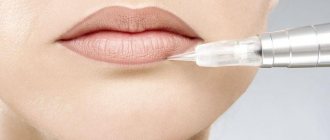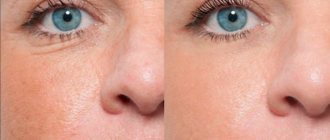Is it possible to enlarge lips during pregnancy?
During pregnancy, hormones are unstable. A woman begins to see extra pounds and other imperfections in her own body. As a result, even pregnant women undergo various beauty injections. Lip augmentation with hyaluronic acid is possible and Botox is not advisable during pregnancy.
The dominant genes of a pregnant woman should be aimed at keeping the offspring healthy and strong. This obliges us not to decorate our body with foreign drugs, but to replenish the body’s natural resources for natural childbearing.
Lip augmentation procedure, a process that takes place under local anesthesia. In any trimester of gestation, the fetus is dangerous for proper development. A child may well be born with a congenital allergy. For the female body, lip augmentation during pregnancy is no less dangerous. At this time, the hormonal system undergoes a restructuring and the level of immunity decreases. This leads to a severe allergy to hyaluronic acid, up to anaphylactic shock and Quincke's edema.
Anesthetics used for injections:
- Lidocaine;
- Novocain;
- Ultracaine.
The above compounds may cause allergic reactions.
Features of injections:
- Injections are considered unpleasant. Patients' pain threshold is reduced. This can put a woman in a state of stress - an extremely undesirable state. Negative emotions provoke uterine hypertonicity, which leads to early labor or miscarriage.
- Lip augmentation during pregnancy with hyaluronic acid leads to the penetration of the drug into colostrum, which forms in the first weeks of pregnancy. This deteriorates the quality of breast milk and interferes with normal lactation.
- Biorevitalization with hyaluronic acid promotes the entry of toxins and proteins of animal origin into the pregnant woman’s body. They are able to penetrate the placenta, provoking the development of cardiac and vascular pathologies in the fetus. In some cases, it can lead to miscarriage.
During pregnancy, lip augmentation is strictly not recommended by doctors. The slightest change in the course of pregnancy entails serious deviations after the birth of the child.
What are the risks?
- Painful sensations can lead to premature contraction of the uterus, which can lead to changes in the natural process of pregnancy and miscarriage.
- The use of anesthesia, painkillers, creams and gels should be avoided. They can affect the child's health.
- It is strictly forbidden to perform hair removal in the intimate area: on the pubis, labia, around the anus.
- During pregnancy, a woman's immunity decreases. Due to this, the damage that the procedure may cause will take longer to heal than usual.
- There is no need to rush to do hair removal immediately after giving birth. It will take several months for hormonal levels to normalize.
- Pregnancy is often accompanied by varicose veins. Laser exposure to varicose veins is strictly prohibited.
- The pregnancy period stimulates remission of atopic dermatitis. When the disease worsens, it is necessary to exclude any influence on the surface of the dermis.
Breastfeeding and beauty injections
Hyaluronic acid is a polysaccharide that serves to hold collagen fibers together. She:
- fills the voids between cells;
- moisturizes the skin;
- has an antioxidant effect at the cellular level.
Any beauty injections are designed to make women of all ages feel beautiful. Like any medicine, there are contraindications, in particular, lip augmentation for pregnant women.
Breastfeeding is a complex chemical process. Any third-party connections can negatively affect this period in the life of a young mother. Not every cosmetologist will intervene in the body. The instructions for the medications even more warn about this. Their use is contraindicated.
Natural hyaluronic acid. There is no mutagenic danger. But Botox is “poison”. For lip augmentation during pregnancy and lactating women, it is reasonably contraindicated.
Additional compounds in administered drugs are unsafe. It seems to many that they cannot do much harm, but the overall picture of the development of organisms can slightly worsen. That is, hyaluronic acid is not on a par with taking potent medications.
When can hair removal be done?
If you have started a course of laser hair removal and find out that you are pregnant, it cannot be continued no matter how far along you are. Even if the procedure does not cause negative sensations or hair in the leg area is to be removed, it is unknown how the body will react to this procedure. If the birth of a child is a planned event, laser hair removal should not be done for six months before conception. If there is a break between sessions of 9 months or more, the procedure must be repeated.
How to protect yourself?
If a woman used hyaluronic injections before the maternity hospital, then there is nothing wrong with giving up this procedure for a while. A healthy child is a priority.
But if beauty injections have become part of the usual rhythm of life, and the pregnant woman cannot see herself without plump lips, then it is quite possible to do without the painful procedure. Safe procedures:
- Nourishing oils for facial skin can easily replace injections of hyaluronic acid. The effect, of course, will not be as long-lasting, but cosmetics do not cause such harm.
- You can use all kinds of pencils and lipsticks. There is nothing supernatural about learning how to draw your own lips beautifully. After all, pregnancy and lactation on average takes about 2-2.5 years.
- Magnesium, iron, vitamin C and D, and omega 3 fatty acids may help. Take everything internally.
Women want to do lip augmentation during pregnancy, because most have not had time to deal with it. Maternity leave lasts at least 3 years. During this time, you can have time to do whatever you want with your appearance.
The fair sex always wants to feel attractive. But due to pregnancy, extra pounds appear, swelling occurs, the skin stretches and partially loses its elasticity. It doesn't make you feel beautiful.
During pregnancy, facial features change, and a global process of rejuvenation occurs due to increased blood flow. Enlarged lips may simply look awkward on a changed face. Is it really necessary?
What is permanent makeup
Translated from English, permanent means “permanent”, “long-term”. However, the result of permanent makeup will not be noticeable after a few years. This is a modern cosmetology method for color correction of lips, eyelids and eyebrows. In essence, it is a tattoo made using needles and special dyes, which, unlike the latter, does not remain on the skin for life. It's beautiful, convenient and inexpensive.
Reasons for the popularity of permanent makeup:
- Makeup for years without the need for correction. Depending on the qualifications of the craftsman and the quality of the materials, it can last 3–5 years.
- Eyelashes look thicker and more beautiful
- You can correct the shape of your eyebrows, change their color and thickness.
- The lips become more voluminous and a clearly defined contour appears. You can highlight natural beauty and correct minor imperfections.
Is it possible to do permanent makeup?
Contraindications may include:
- severe forms of diabetes mellitus,
- exacerbation of chronic diseases,
- ARVI,
- increase in body temperature,
- psoriasis in the acute stage,
- HIV,
- immunodeficiency states,
- hemophilia,
- anemia,
- alcohol consumption,
- intolerance to anesthetic drugs,
- individual intolerance to pigments,
- pustular skin diseases.
Should you enlarge your lips during pregnancy or not?
Most experts are inclined to believe that it is impossible. Such procedures are fraught with allergies in the mother, problems with intrauterine development of the fetus and its subsequent life. For unknown reasons, a pregnant woman becomes more attractive in appearance than before. This is due to changes in hormonal and, for the most part, emotional background. Expectant mothers become calmer, more measured, and pay more attention to home, husband and family in general.
Most professional cosmetologists refrain from lip augmentation for pregnant women. And beginners are simply afraid of harming the client. The hyaluron used in cosmetic procedures is synthetic. Any specialist who respects himself, his client and his work will first of all require hormone tests in order to select the right drug or refuse the procedure. Even if such beauty injections did not stop during the first pregnancy, no one can guarantee that everything will be smooth in the second.
The human body is unique. Even confidence in your own body does not mean that the second child inside will take everything well, just like the first.
Any beauty injections carry a hidden threat, even if the drug is the same. Manufacturers may change. No one knows, maybe after lip augmentation a pregnant woman will feel very bad.
Hyaluronic acid, Botox, fillers are all synthetic substances with a similar composition to natural ones. But they are still alien to the body. Nature tries to give a person the correct balance of facial features and body contours. It is worth loving your body the way it is, especially during pregnancy and breastfeeding.
Does hair removal harm the unborn child?
There is no evidence of direct effects of laser hair removal on the fetus. Experts have not yet studied the impact of technology on the body of a pregnant woman. Theoretically, the procedure has a superficial effect and does not penetrate into the deeper layers of the dermis. However, doctors are of the opinion that the period of bearing a child is a contraindication for hair removal. They call for the prudence of expectant mothers, who, first of all, should think about the health of their baby.
To reduce the likelihood of side effects, you should use standard hair removal methods: shaving, depilatory cream, waxing (warm, cold). Please note that if the dermis is highly sensitive, when using wax, a woman may experience painful spasms, as a result, the tone of the uterus will increase, which is also dangerous for the fetus.
Hypertrophy of the labia minora - symptoms and treatment
Treatment of hypertrophy of the labia minora is only surgical, however, if you follow certain recommendations, discomfort due to protruding labia minora can be minimized, thereby avoiding surgery and possible complications:
- For hygiene of the external genitalia, use only special products or mild soap without dyes, fragrances and chemicals. Rinse off the soap thoroughly with water.
- Avoid tight, uncomfortable underwear that chafes. Choose loose, breathable materials such as cotton.
- Wear tight trousers, leggings and hosiery as little as possible. Choose dresses, skirts, loose pants or shorts.
- Choose sanitary pads and tampons without fragrances, chemicals or additives.
- Before exercising or wearing tight clothing (such as a swimsuit), position your labia so as not to feel discomfort.
If discomfort persists, surgical correction may be considered. Surgery to reduce the size of the labia minora is called labiaplasty . The first mentions of plastic surgery in the intimate area appeared in the mid-80s. XX century in the West. The prototype of this surgical manipulation is the ritual manipulation of some countries. For example, in Arab countries, girls have their labia minora partially or completely removed without any medical indications, only as a tribute to tradition. This ritual is still performed today. Many consider it a violation of human rights and discrimination against women [3][8]. It’s a completely different matter when a woman consciously agrees to such manipulation.
Great demand for intimate plastic surgery appeared at the beginning of the 21st century and now it is also quite high. Doctors do not oppose this trend, but support it with some reservations:
- due to the complexity of the procedure, operations should only be performed by surgeons who have undergone special education and training;
- a woman must make her own decision regarding surgical intervention, and not under pressure from a partner or on the advice of a gynecologist;
- the patient should know that this branch of medicine does not have a sufficient regulatory framework.
There is an International Society of Cosmetic Gynecology, which includes about a million specialists in the field who regularly exchange scientific knowledge. Many doctors offer original methods of surgical treatment of hypertrophy of the labia minora. However, you should not trust innovations that have not undergone sufficient clinical trials and have not received scientific recognition.
The goal of labiaplasty is to reduce hypertrophic labia minora and achieve optimal color and texture of the labial margins with minimal invasiveness and preservation of neurovascular supply [14]. However, surgical correction is not available to every patient. There are contraindications:
- increased risk of bleeding due to bleeding disorders;
- sexually transmitted infections;
- vulvovaginitis (inflammation of the vulva and vagina) and vaginitis (inflammation of the vagina);
- oncological processes;
- minor age;
- pregnancy;
- mental disorders.
For adolescents under 18 years of age, any intervention should be discussed with parents. The procedure is not indicated for minor patients. However, it can be addressed in the presence of physiological abnormalities that can negatively affect the sexual development of a girl [2].
Before the operation, you need to consult a gynecologist and undergo the required diagnostic procedures:
- take a smear to determine vaginal flora;
- take a blood serum test for HIV, syphilis and hepatitis and;
- take a blood test for a coagulogram (blood clotting), do biochemical blood and urine tests.
- undergo an ECG if surgery will be performed using general anesthesia.
There is no single ideal approach to labiaplasty. Each method has its own unique advantages and disadvantages.
Types of surgical treatment methods
Direct reduction labiaplasty is a direct approach to volume reduction. The aesthetic result of direct removal leaves much to be desired. Natural color, contours and texture are lost. In addition, the scar may be visible [13].
Sectoral reduction labiaplasty. Wedge resection allows for comparable volume reduction with direct excision while maintaining the natural lip contour [5][18].
Composite reduction labiaplasty aims to correct the clitoral protrusion and hood in addition to labial reduction. However, this procedure takes significantly longer than the methods described above. Its duration is about 2 hours [16].
To increase elasticity, along with labiaplasty, injections of hyaluronic acid are additionally made. With their help, the effect of increasing tissue turgor (density), i.e. rejuvenation, is achieved.
After surgery, to prevent possible complications, the patient is prescribed a course of antibiotics and antifungal drugs and given recommendations:
- After each urination or defecation, but at least 3-4 times a day, take a hygienic shower using an intimate hygiene product (“Lactacid”). You need to wash the operated area as carefully as possible.
- After a shower, treat the seams with an aqueous solution of chlorhexidine, Furacilin or a decoction of chamomile. Processing time is at least 4 weeks. After hygiene measures, it is additionally recommended to apply Bepanten ointment to the surface of the seams. Dosages of local drugs are selected according to the instructions that come with them.
- Avoid any physical or sexual activity for a month after surgery [10].
Postoperative examinations are carried out at 1 week, 2 weeks, 1 month and 3 months after the intervention. After 2 weeks, the stitches are removed, if they were not removed earlier.
Despite following all the doctor’s recommendations, the following complications may occur after surgery:
- diseases of an inflammatory and infectious nature;
- noticeable adhesions and scars;
- subcutaneous bruises (hematomas);
- dissatisfaction with the result obtained (insufficient or too strong reduction);
- loss or decrease in sensitivity of the labia;
- bleeding.











